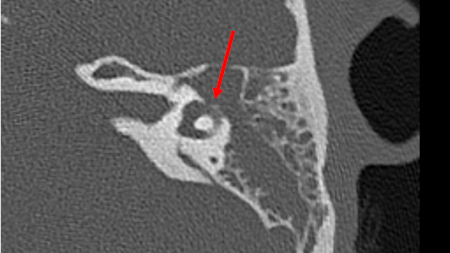Резюме
Определение
Анамнез и осмотр
Ключевые диагностические факторы
- vertigo
- dizziness
- nausea and vomiting
- hearing loss
- nystagmus
- tinnitus
- otorrhea
Другие диагностические факторы
- vertigo-related quick head or body movements
- influenza-like symptoms
- otalgia
Факторы риска
- viral infections
- chronic suppurative otitis media
- acute otitis media
- cholesteatoma
- meningitis
- inner ear malformations
- autoimmune ear diseases
- syphilis
Диагностические исследования
Исследования, которые показаны в первую очередь
- audiogram
- Weber test
- Rinne test
Исследования, проведение которых нужно рассмотреть
- CT or MRI brain
- videonystagmography (VNG)
- head impulse testing (HIT) and video head impulse testing (vHIT)
- rotary chair test
- vestibular-evoked myogenic potentials (VEMPs)
- syphilis serology
- cerebrospinal fluid Gram stain and culture
- serum HIV rapid test
- basic metabolic profile (including BUN and creatinine)
Алгоритм лечения
labyrinthitis
vestibular neuritis
with persistent vestibular symptoms posttreatment
Colaboradores
Autores
Tiffany Peng Hwa, MD
Assistant Professor
Medical Director, Center for Adult Onset-Hearing Loss
Director, Temporal Bone Surgical Dissection Laboratory
Division of Otology & Neurotology
Department of Otolaryngology-Head and Neck Surgery
University of Pennsylvania Health System
Philadelphia
PA
Divulgaciones
TPH has received honoraria from Amgen/Horizon Therapeutics for participation on the advisory board for ototoxicity and the agent, teprotumumab. TPH has given numerous educational lectures to trainees for nonpay, not specifically focused on labyrinthitis or vestibular neuritis. MedEl has reimbursed TPH for attendance at a cochlear implant training workshop regarding their new anatomy-based fitting technology. TPH has a pending NIH grant application regarding central auditory processing and speech perception assessment that has no relationship to labyrinthitis or vestibular neuritis. TPH has an investigator-initiated research grant from Cochlear Corporation, also unrelated to labyrinthitis or vestibular neuritis.
Agradecimientos
Dr Tiffany Peng Hwa would like to gratefully acknowledge Dr Brandon Isaacson, the previous contributor to this topic.
Divulgaciones
BI is an author of a reference cited in this topic.
Revisores por pares
Lawrence R. Lustig, MD
BMJ Best Practice ENT expert panel member
Professor and Chair
Department of Otolaryngology
Columbia University Vagelos College of Physicians and Surgeons
New York
NY
Divulgaciones
LRL declares that he has no competing interests.
Desi Schoo, MD
Assistant Professor of Otology, Neurotology, and Cranial Base Surgery
Department of Otolaryngology-Head and Neck Surgery
The Ohio State University Wexner Medical Center
Columbus
OH
Divulgaciones
DS declares that he has no competing interests.
Iain Swan, MD, FRCS
Senior Lecturer in Otolaryngology
Honorary Consultant Otolaryngologist
Glasgow Royal Infirmary
Glasgow
UK
Divulgaciones
IS declares that he has no competing interests.
Agradecimiento de los revisores por pares
Los temas de BMJ Best Practice se actualizan de forma continua de acuerdo con los desarrollos en la evidencia y en las guías. Los revisores por pares listados aquí han revisado el contenido al menos una vez durante la historia del tema.
Divulgaciones
Las afiliaciones y divulgaciones de los revisores por pares se refieren al momento de la revisión.
Referencias
Artículos principales
Strupp M, Bisdorff A, Furman J, et al. Acute unilateral vestibulopathy/vestibular neuritis: Diagnostic criteria. J Vestib Res. 2022 Jun 11;32(5):389-406.Texto completo Resumen
Chandrasekhar SS, Tsai Do BS, Schwartz SR, et al. Clinical practice guideline: sudden hearing loss (update). Otolaryngol Head Neck Surg. 2019 Aug;161(suppl 1):S1-45.Texto completo Resumen
Artículos de referencia
Una lista completa de las fuentes a las que se hace referencia en este tema está disponible para los usuarios con acceso a todo BMJ Best Practice.

Diferenciales
- Meniere disease
- Posterior fossa cerebrovascular accident
- Temporal bone fracture
Más DiferencialesGuías de práctica clínica
- Suspected neurological conditions: recognition and referral
- Practice guidance: vestibular rehabilitation
Más Guías de práctica clínicaFolletos para el paciente
Labyrinthitis and vestibular neuritis
Más Folletos para el pacienteVideos
How to examine the ear
Más vídeosInicie sesión o suscríbase para acceder a todo el BMJ Best Practice
El uso de este contenido está sujeto a nuestra cláusula de exención de responsabilidad